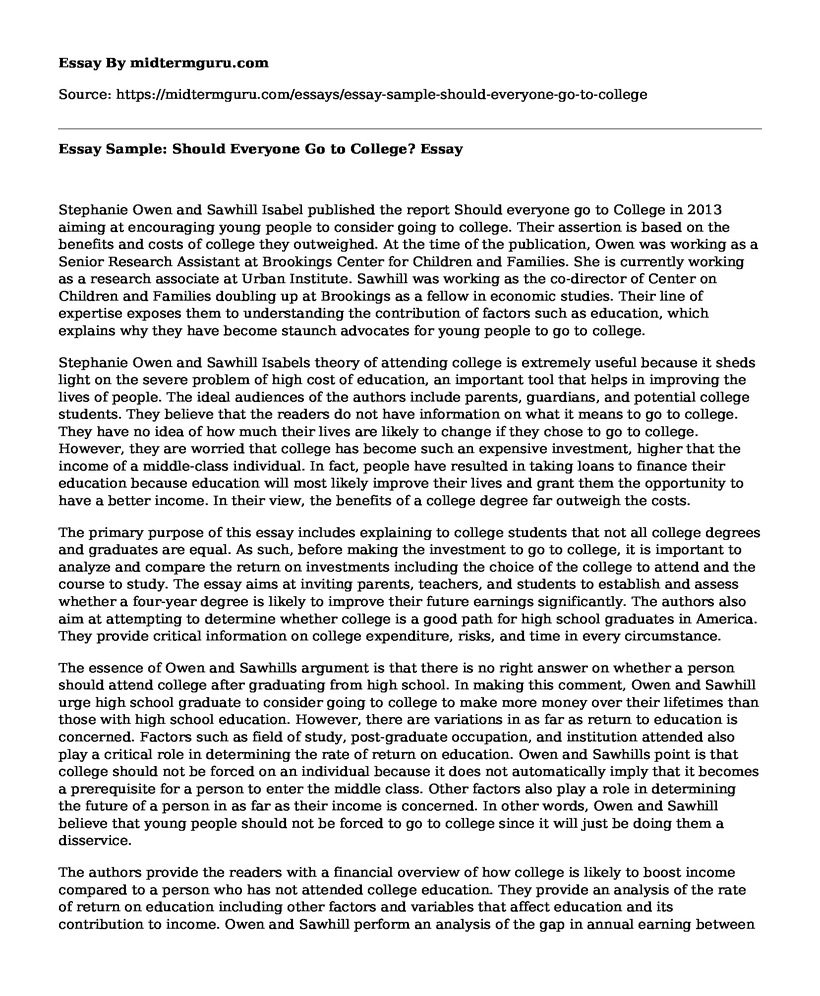Stephanie Owen and Sawhill Isabel published the report Should everyone go to College in 2013 aiming at encouraging young people to consider going to college. Their assertion is based on the benefits and costs of college they outweighed. At the time of the publication, Owen was working as a Senior Research Assistant at Brookings Center for Children and Families. She is currently working as a research associate at Urban Institute. Sawhill was working as the co-director of Center on Children and Families doubling up at Brookings as a fellow in economic studies. Their line of expertise exposes them to understanding the contribution of factors such as education, which explains why they have become staunch advocates for young people to go to college.
Stephanie Owen and Sawhill Isabels theory of attending college is extremely useful because it sheds light on the severe problem of high cost of education, an important tool that helps in improving the lives of people. The ideal audiences of the authors include parents, guardians, and potential college students. They believe that the readers do not have information on what it means to go to college. They have no idea of how much their lives are likely to change if they chose to go to college. However, they are worried that college has become such an expensive investment, higher that the income of a middle-class individual. In fact, people have resulted in taking loans to finance their education because education will most likely improve their lives and grant them the opportunity to have a better income. In their view, the benefits of a college degree far outweigh the costs.
The primary purpose of this essay includes explaining to college students that not all college degrees and graduates are equal. As such, before making the investment to go to college, it is important to analyze and compare the return on investments including the choice of the college to attend and the course to study. The essay aims at inviting parents, teachers, and students to establish and assess whether a four-year degree is likely to improve their future earnings significantly. The authors also aim at attempting to determine whether college is a good path for high school graduates in America. They provide critical information on college expenditure, risks, and time in every circumstance.
The essence of Owen and Sawhills argument is that there is no right answer on whether a person should attend college after graduating from high school. In making this comment, Owen and Sawhill urge high school graduate to consider going to college to make more money over their lifetimes than those with high school education. However, there are variations in as far as return to education is concerned. Factors such as field of study, post-graduate occupation, and institution attended also play a critical role in determining the rate of return on education. Owen and Sawhills point is that college should not be forced on an individual because it does not automatically imply that it becomes a prerequisite for a person to enter the middle class. Other factors also play a role in determining the future of a person in as far as their income is concerned. In other words, Owen and Sawhill believe that young people should not be forced to go to college since it will just be doing them a disservice.
The authors provide the readers with a financial overview of how college is likely to boost income compared to a person who has not attended college education. They provide an analysis of the rate of return on education including other factors and variables that affect education and its contribution to income. Owen and Sawhill perform an analysis of the gap in annual earning between a high school graduate and a college graduate. They assert that the benefits of a degree outweigh the benefits and therefore for students who get the opportunity to go to college they should embrace the opportunity to study and improve their lives.
Owen and Sawhill on the other hand also evaluate the cost of going through a college education. They assert that it is not always true that a person needs to go to college to make their lives better. University tuitions are increasing by the day making college less unaffordable for most of the high school education. They tend to start depending on loans to finance their education, which exposes them to greater risks. The evidence used by Owen and Sawhill are useful in allowing the readers to understand both sides of the issue and be able to make a logical decision on whether to go to college. The authors have also ensured that they leave the decision on whether to go to college or not to the audience. They have only provided factors that need to be considered when making a decision about attending college. The authors have successfully built their argument on whether to go to college or not. They present the readers with logical reasoning that supports the decision they will make.
Cite this page
Essay Sample: Should Everyone Go to College?. (2021, Jun 08). Retrieved from https://midtermguru.com/essays/essay-sample-should-everyone-go-to-college
If you are the original author of this essay and no longer wish to have it published on the midtermguru.com website, please click below to request its removal:
- Review of the Book Other Peoples Children: Cultural Conflict in the Classroom
- Motivation Letter for Master of Public Health
- Essay on Event or Set of Events That You Find Significant
- Paper Example on Drugs And Substance Abuse Among Students
- Why College Tuition Should Not Be Free - Argumentative Essay
- Paper Example on Effects of Cyberbullying amongst College Students
- Meta-Evaluations: Quality Assurance for Evaluation Programs - Research Paper







